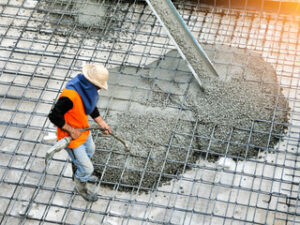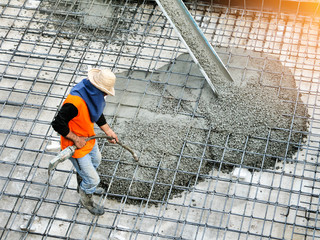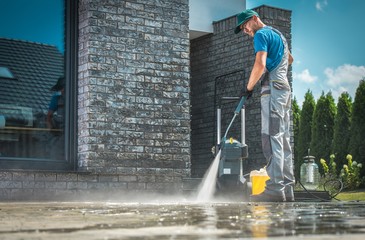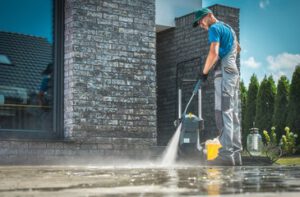Concrete contractors transform construction visions into a tangible reality. They use specialized knowledge and craftsmanship to execute their plans accurately and efficiently.
They follow building codes for safety and ensure their work looks professional. They are also skilled at resolving concrete issues that can affect the structural integrity of buildings. Contact Golden Concrete Experts for professional help.
Concrete is a versatile construction material that can be used in many different projects. However, only a qualified contractor can work with it as safely and efficiently as possible to create structures that are durable, sturdy, and long-lasting. They should have extensive knowledge of the proper ways to prepare, mix, and pour concrete as well as how to properly cure it in order to get the most out of this exceptional building material.
Concrete contractors know the right ingredients to use for each project. They have a thorough understanding of the types of concrete and their best applications, including high-strength concrete that can resist larger amounts of force without breaking. They also understand how to control moisture and temperature during curing in order to achieve the ideal concrete properties.
The most reliable concrete experts have years of experience working on a variety of projects. This extensive knowledge of the industry allows them to handle any challenges that may arise during a project, ensuring that it is completed on time and within budget. They are also able to recommend the best materials for each project, which ensures that the final result is of the highest quality and meets industry standards.
In addition to new concrete construction, experienced concrete specialists can help with complicated restoration projects. These include repairing and revitalizing weather-worn and historical structures, as well as determining how to repair structural damage. Their detailed analysis and engineering plans help ensure that damaged buildings can be restored to their original glory while still meeting modern building codes and durability requirements.
Licensed concrete contractors have a portfolio of their work available to examine. Their attention to detail is unmatched, and they are always aiming for perfection. This is a sign of their commitment to excellence, and it means that their clients can rest assured knowing that their work will stand the test of time. They also conform to the necessary building codes for safety, which protects their clients against costly mistakes. Those who try to take on concrete projects themselves often lack the proper equipment and experience, making them more susceptible to errors that can lead to costly repairs later on.
Experienced Work
The majority of concrete contractors learn their trade skills through hands-on experience, often starting as apprentices or trainees. As they gain on-the-job training, they can learn to recognize pitfalls and develop a deep understanding of best practices for executing concrete work. This industry knowledge can help them avoid costly mistakes during construction and ensure that projects meet quality benchmarks.
When interviewing concrete professionals, ask for a portfolio of past projects. Examine their work closely and pay special attention to projects similar to your own in scope and complexity. This will give you a better idea of their ability to handle the unique challenges that your project may present.
A professional concrete contractor will have a comprehensive understanding of concrete materials and construction techniques, as well as building codes and standards. They should also have extensive hands-on experience in the field, including pouring, finishing, and curing concrete. This experience is necessary for creating durable, long-lasting concrete structures that will stand the test of time.
In addition to concrete construction, professional concrete contractors can also provide concrete repair and replacement services. They have the tools and equipment needed to perform a wide range of tasks, from crack sealing to resurfacing and new installations. They can also recommend cost-effective strategies that will save you money in the long run without sacrificing quality.
When hiring a concrete contractor, be sure to discuss your budget and timeline. A reputable contractor will be able to provide you with a detailed estimate that includes all costs, including labor and materials. A transparent pricing structure will prevent misunderstandings and ensure that the final results match your expectations.
A concrete specialist can also make your residential or commercial concrete construction project more visually appealing by using decorative finishes. By combining concrete stamping and staining, they can create the look of natural stones or brick pavers at a fraction of the cost. In addition, concrete experts can install stamped and colored concrete on your driveway, patio, sidewalk, or garage floor to increase the value of your home.
A pervious concrete contractor certification is a valuable credential for ready mixed concrete personnel, inspectors, testing labs, and engineers that are involved in the placement of pervious concrete. The certification program is administered by local sponsoring groups in conjunction with planned training sessions or demonstrations of pervious concrete placement.
Licenses and Permits
When choosing a concrete contractor, it is important to look for a state license. This shows that they have met local and state standards for construction, including concrete work. They should also have liability and workers’ compensation insurance coverage to protect you in the event of an accident on the job site.
In addition to a state license, you should ask potential contractors for references and examples of their previous projects. Checking out their portfolio will help you assess their skill and experience in the field, as well as their ability to meet deadlines and deliver a quality outcome. It is also helpful to discuss any specific concerns or requirements you may have for your project, and ensure that the contractor can accommodate these needs.
Class C8 licensed contractors are proficient in a wide range of tasks related to concrete, which is an essential material for commercial and residential construction. Some of their responsibilities include mixing, fabricating, and placing concrete to precise specifications for structural integrity and compliance with building codes. Additionally, they are skilled in decorative concrete work, such as stamping and staining.
Those looking to pursue a Class C8 licensing exam should invest in thorough preparation and study materials, as the process is rigorous and competitive. Taking preparatory courses, studying with study groups, and participating in practice tests can help candidates develop the knowledge and skills necessary to succeed on the test.
It is also crucial to verify that a concrete contractor has all the necessary permits before beginning construction on a project. Depending on the size and scope of the project, various permits may be required, such as building, zoning, and environmental. For example, a permit may be required for foundation concrete construction to comply with local and state air quality regulations and protect against environmental hazards like silica dust and air pollution.
For concrete work to be completed safely and in accordance with building codes, the contractor must pass inspections at several points throughout the construction process. The first inspection is typically pre-construction, when the contractor reviews project plans and inspects the work site to ensure that it meets standards. Subsequent inspections are conducted during the construction phase to monitor adherence to codes, and final inspection and certification are performed before occupancy.
Quality Control
Concrete Experts follow standard procedures to ensure the quality of the work they do. This includes reviewing the material used to make sure it meets the project specifications and observing how the concrete is handled on-site. They also use testing and inspection tools to determine the structural integrity of the concrete structure. They may also provide insights into whether the installation practices were in compliance with industry standards and building codes.
Concrete experts often help courts and legal teams with construction litigation cases. They can evaluate and testify on issues such as concrete cracking, failure to meet quality standards, improper curing, and structural failures. They can also help to explain the technical aspects of concrete construction and provide insight into the liability of a case, which will be beneficial for both sides.
Quality control is a vital part of any construction project, and this is especially true for projects that involve concrete. Whether you need concrete for a new road or sidewalk, a water treatment plant, or any other type of commercial or industrial construction, you need to be confident that the concrete you receive is high-quality. Without adequate quality control, you could face costly delays and structural failures.
A qualified concrete contractor will follow strict safety plans and implement OSHA requirements to protect the health and wellbeing of crew members. This will help prevent accidents and injuries, which can be costly for your business. They will also have the training and experience to understand the nuances of working with concrete materials, so they can recommend the best products and methods for each job.



